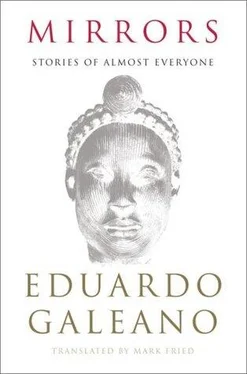
Pu Yi was three years old in 1908 when he first sat on the throne reserved for the Sons of Heaven. The minuscule emperor was the only person in China allowed to wear yellow. The great crown of pearls slipped over his eyes, but there was not much to look at anyway. Swimming inside tunics of silk and gold, he was bored with the immensity of the Forbidden City, his palace, his prison, forever surrounded by a throng of eunuchs.
The monarchy fell and Pu Yi became Henry, christened by the English. Later on, the Japanese sat him on the throne of Manchuria, and he had three hundred courtiers who ate the leftovers from his ninety dishes.
Tortoises and cranes symbolize eternal life in China. Though Pu Yi was neither a tortoise nor a crane, he managed to keep his head on his shoulders, something quite uncommon in his line of work.
In 1949, when Mao took power, Pu Yi crowned his career by converting to Marxism-Leninism.
At the end of 1963, when I interviewed him in Beijing, he was dressed like everyone else, blue uniform buttoned to the collar, his worn shirt cuffs protruding from the sleeves of his coat. He made his living by pruning plants in the Beijing Botanical Garden.
He was surprised that anyone would be interested in talking to him. He recited his mea culpa, “I am a traitor, I am a traitor,” and in an unwavering monotone he repeated slogans for a couple of hours.
Every so often, I was able to interrupt him. Of his aunt, the empress, the phoenix, all he recalled was her deathlike face, which so frightened him he cried. She gave him a candy and he threw it on the floor. The women in his life he met via photographs that the mandarins or the English or the Japanese gave him to choose from. Until at last, thanks to President Mao, he had been able to marry the woman he truly loved.
“Who is she, if you don’t mind my asking?”
“A worker, a hospital nurse. We got married on May 1st.”
I asked him if he was a member of the Communist Party. No, he was not.
I asked him if he would like to be.
The interpreter was named Wang, not Freud, and he must have been exhausted, because he translated:
“For me, that would be a tremendous horror.”
FORBIDDEN TO BE INDEPENDENT

In the middle of 1960, the Congo, until then a Belgian colony, celebrated its independence.
Speech followed speech, and the audience was melting from heat and boredom. Belgium, a strict teacher, warned of the dangers of freedom. The Congo, grateful pupil, promised to behave.
Then Patrice Lumumba’s speech exploded and ruined the party. He spoke out against the “empire of silence,” and through him the silenced found a voice. He paid homage to the fathers of independence, the murdered, the imprisoned, the tortured, and the exiled, who throughout so many years had fought “to bring to an end the humiliating slavery imposed on us by force.”
His words, received in icy silence by the Europeans present, were interrupted eight times by ovations from the Africans in the audience.
That speech sealed his fate.
Lumumba, recently released from prison, had won the first free elections in the Congo’s history, and headed up its first government. But the Belgian press called him a “delirious and illiterate thief.” In Belgian intelligence cables, Lumumba was dubbed Satan. The director of the CIA, Allen Dulles, sent instructions to his agents:
“The removal of Lumumba must be an urgent objective.”
Dwight Eisenhower, president of the United States, told British Foreign Secretary Lord Alec Douglas-Home:
“I wish Lumumba would fall into a river full of crocodiles.”
Lord Douglas-Home took a week to reply:
“Now is the time to get rid of Lumumba.”
And the minister for African affairs of the Belgian government, Harold d’Aspremont Lynden, offered his own opinion:
“Lumumba must be eliminated once and for all.”
At the beginning of 1961, a firing squad of eight soldiers and nine policemen commanded by Belgian officers shot him along with his two closest collaborators.
Fearing a popular uprising, the Belgian government and its Congolese tools, Mobutu Sese Seko and Moise Tshombe, covered up the crime.
Two weeks later, the new president of the United States, John Kennedy, announced:
“We will not allow Lumumba to return to the government.”
And Lumumba, who by then had already been killed and dissolved in a barrel of sulfuric acid, did not return to the government.

The assassination of Lumumba was an act of colonial reconquest.
The Congo’s mineral wealth, copper, cobalt, diamonds, gold, uranium, oil, gave the orders from the depths of the earth.
The sentence was carried out with the complicity of the United Nations. Lumumba had good reason to mistrust the officers of troops that claimed to be international, and he denounced “the racism and paternalism of people whose only vision of Africa is lion hunting, slave markets, and colonial conquest. Naturally they would understand the Belgians. They have the same history, the same lust for our wealth.”
Mobutu, the free-world hero who trapped Lumumba and had him crushed, held power for more than thirty years. The international financial institutions recognized his merits and showered him with generosity. By the time he died, his personal fortune was nearly equal to the foreign debt of the country to which he had devoted his best energies.
But Lumumba had announced:
“History will one day have its say. It will not be the history taught in the United Nations, Washington, Paris, or Brussels. Africa will write its own history.”
The tree where Lumumba was executed still stands in the woods of Mwadingusha. Riddled with bullets. Like him.

In the fifties, terrorism was black, its name was Mau Mau, and it hid out in the shadows of the Kenyan jungle.
According to world opinion, the Mau Mau danced as they slit the throats of the English. Then they chopped them to pieces, and in satanic ceremonies drank their blood.
The supposed leader of those savages, Jomo Kenyatta, fresh out of prison, became the first president of his free country in 1964.
Later on, it came out: during the years of struggle for independence, fewer than two hundred British citizens, civilians or soldiers, had been slain. More than ninety thousand natives were hanged, shot, or killed in concentration camps.

When Belgium left the Congo, a total of three Congolese held positions of responsibility in government.
When Great Britain left Tanzania, the country had but two engineers and twelve doctors.
When Spain left Western Sahara, the country had one doctor, one lawyer, and one specialist in commerce.
When Portugal left Mozambique, the country had a 99 percent illiteracy rate, not a single high school graduate, and no university.

Thomas Sankara changed Upper Volta’s name. The old French colony came to be called Burkina Faso, “land of honest men.”
Following the long period of colonial domination, honest men inherited a desert: fields exhausted, rivers gone dry, forests devastated. One of every two newborns did not survive beyond three months old.
Читать дальше


















